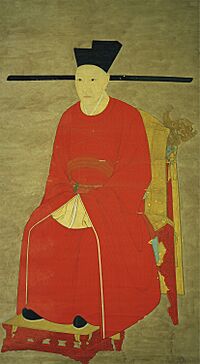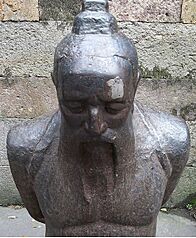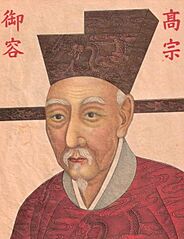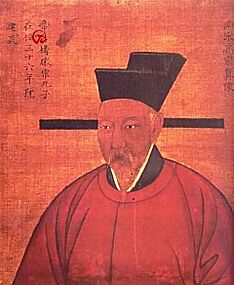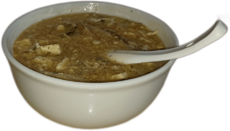Emperor Gaozong of Song facts for kids
Quick facts for kids Emperor Gaozong of Song宋高宗 |
|||||||||||||
|---|---|---|---|---|---|---|---|---|---|---|---|---|---|
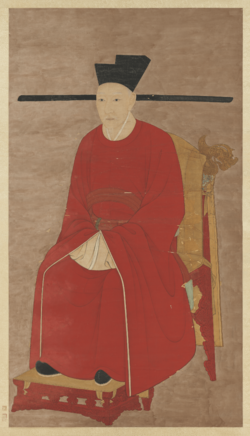
|
|||||||||||||
| Emperor of the Song dynasty | |||||||||||||
| Reign | 12 June 1127 – 26 March 1129 | ||||||||||||
| Coronation | 12 June 1127 | ||||||||||||
| Predecessor | Emperor Qinzong | ||||||||||||
| Successor | Zhao Fu | ||||||||||||
| Reign | 20 April 1129 – 24 July 1162 | ||||||||||||
| Predecessor | Zhao Fu | ||||||||||||
| Successor | Emperor Xiaozong | ||||||||||||
| Retired Emperor of the Song dynasty | |||||||||||||
| Reign | 24 July 1162 – 9 November 1187 | ||||||||||||
| Born | Zhao Gou 12 June 1107 Bianliang, Northern Song (present-day Kaifeng, Henan, China) |
||||||||||||
| Died | 9 November 1187 (aged 80) Lin'an, Southern Song (present-day Hangzhou, Zhejiang, China) |
||||||||||||
| Burial | Yongsi Mausoleum (永思陵, in present-day Shaoxing, Zhejiang) | ||||||||||||
| Consorts | |||||||||||||
| Issue | Zhao Fu Second Princess Kang Third Princess Kang Fourth Princess Kang Fifth Princess Kang |
||||||||||||
|
|||||||||||||
| House | Zhao | ||||||||||||
| Dynasty | Song (Southern Song) | ||||||||||||
| Father | Emperor Huizong | ||||||||||||
| Mother | Empress Xianren | ||||||||||||
| Signature |  |
||||||||||||
| Emperor Gaozong of Song | |||||||
|---|---|---|---|---|---|---|---|
| Chinese | 宋高宗 | ||||||
| Literal meaning | "High Ancestor of the Song" | ||||||
|
|||||||
| Zhao Gou | |||||||
| Traditional Chinese | 趙構 | ||||||
| Simplified Chinese | 赵构 | ||||||
|
|||||||
| Deji (courtesy name) |
|||||||
| Chinese | 德基 | ||||||
|
|||||||
Emperor Gaozong of Song (born Zhao Gou) was an important emperor of China's Song dynasty. He was born on June 12, 1107, and died on November 9, 1187. He became the tenth emperor of the Song dynasty and the first ruler of the Southern Song dynasty. He ruled from 1127 to 1162. After that, he became a retired emperor and still had power until he died in 1187.
Gaozong was the ninth son of Emperor Huizong. His older half-brother was Emperor Qinzong. When the capital city of Bianjing (today's Kaifeng) was attacked by the Jurchen-led Jin dynasty in 1127, Zhao Gou was not there. This event started the Jin-Song Wars. He managed to escape being captured by the Jin forces. He first went to Yangzhou and then to Lin'an (today's Hangzhou). There, he became emperor and started the Song court again.
Even though he faced many problems, like Jin invasions and a short time when he was removed from power in 1129, Emperor Gaozong became a strong leader. He led the Song dynasty through ongoing wars with the Jin. Before 1141, military leaders like Han Shizhong and Yue Fei won back parts of the Central Plains. At the same time, important officials called chancellors, such as Qin Hui, managed the government.
In 1141, Gaozong and Qin Hui worked together to make a peace deal with the Jin. This deal was called the Treaty of Shaoxing. It meant the Song dynasty gave up the Central Plains and agreed to pay tribute to the Jin. But this treaty brought twenty years of peace. This allowed the Southern Song state to become stable and start good trade with the Jin. It also stopped Emperor Qinzong, who was still held captive by the Jin, from coming back and possibly taking Gaozong's throne. Gaozong and Qin Hui then made sure the government had control over the military. They forced Han Shizhong and General Zhang Jun to retire. They also unfairly put Yue Fei to death.
Even with his successes, Gaozong's actions against Yue Fei, who was seen as a hero, and giving up half of Song China to the enemy, hurt his reputation. People in history and in popular stories blamed Gaozong, his father, and his half-brother for the Song dynasty's problems.
Gaozong's only son, Zhao Fu, died when he was a child. In 1160, Gaozong adopted a distant relative named Zhao Yuan. He made him crown prince in 1162, just before he stepped down from the throne. Even after he retired, Gaozong still had real control over state matters as the retired emperor. He continued to guide the dynasty until he died naturally in 1187, at 80 years old.
Contents
Early Life and Escape
Emperor Gaozong was the ninth son of Emperor Huizong. His mother, Empress Xianren, was one of Huizong's wives. Gaozong was known as Prince Zhao Gou before he became emperor.
When his father, Huizong, gave up the throne, his older brother Qinzong became emperor. At this time, the capital city, Bianjing, was under attack by the Jurchens. Qinzong sent Zhao Gou to the Jurchen camp to try and make peace. Zhao Gou was held for ransom but later returned because the Jurchens doubted who he was.
In 1127, the Jurchen-led Jin Empire captured his father, his half-brother, and the capital city in an event called the Jingkang Incident. Most of the royal family members were also captured. Zhao Gou was on a diplomatic trip in Cizhou at the time, so he was not in Bianjing. This allowed him to escape to Southern China. To avoid the Jin troops, Zhao Gou had to move from province to province. The Jurchens tried to trick him into coming back to Bianjing, but they failed. Zhao Gou finally reached Jiankang (today's Nanjing), which became one of the Song's temporary capitals.
Becoming Emperor
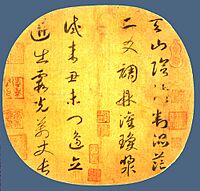
Zhao Gou showed that he was a very capable leader. The remaining members of the royal court supported him becoming emperor. He re-established the Song Empire, which is now known as the Southern Song dynasty. He was named Emperor Gaozong in Jiankang (present-day Nanjing). His new reign name, Jianyan, means "Establishing the Fire." This showed that the Southern Song dynasty was a continuation of the Northern Song. He later moved to Yingtianfu (modern Shangqiu) because of its historical importance to Emperor Taizu of Song.
From 1127 to 1129, the Song dynasty sent thirteen groups to the Jin to talk about peace. They also wanted to get Gaozong's mother and Huizong released, but the Jin court ignored them. The Jin Empire had set up a puppet state called Da Chu. This state was ended in 1127 when its leader, Zhang Bangchang, and the former Empress Meng, joined Emperor Gaozong. Gaozong then ordered Zhang's execution because of pressure from his officials.
Emperor Gaozong's early rule was full of Jurchen attacks. This was partly because Zhang's execution and Da Chu joining the Song made the Jin renew their attacks. Gaozong first used military leaders like Li Gang, Zong Ze, Yue Fei, and Han Shizhong to fight off the Jurchens. He also wanted to improve his public image by promising to bring back the Song Empire's past glory. However, when one of Li Gang's armies won a big victory against the Jin, the emperor removed Li Gang from his position. Some people thought this was because Gaozong did not want to win too much, as it might lead to Emperor Qinzong being returned to the throne.
Because Yingtianfu was not safe, Emperor Gaozong moved to Yangzhou in late 1127 or early 1128. But Yangzhou also became unsafe when the Jurchens got too close. When the Jurchens reached the Huai River, the court partly moved to Lin'an (modern Hangzhou) in 1129. Days later, Gaozong barely escaped on horseback, just hours before Jin troops arrived.
Challenges and Moving the Capital
On March 26, 1129, Gaozong lost his throne for a short time due to a mutiny. Palace guards, led by Miao Fu and Liu Zhengyan, were unhappy with Gaozong's choices. They started a rebellion, claiming that certain officials were plotting against the emperor. They killed an important official and forced Gaozong to step down. His two-year-old son, Zhao Fu, was made emperor.
However, this plot ended less than a month later, on April 20, 1129. Miao and Liu were defeated by Gaozong's loyal army, led by Han Shizhong. Both mutiny leaders were put to death for treason. Gaozong's son later died from illness after being emperor for only three months. After Gaozong got his throne back, he was still chased by Jin forces. He did not fully control southern China until the late 1130s. This mutiny made Emperor Gaozong move his capital to Jiankang.
In 1130, a Jurchen general named Wuzhu crossed the Yangtze River and captured Jiankang. Wuzhu quickly moved to try and capture Gaozong. The Jin took Hangzhou on January 22 and then Shaoxing further south on February 4. Emperor Gaozong almost got caught by Wuzhu near Lin'an. But General Zhang Jun slowed down the Jin advance, giving Emperor Gaozong a chance to escape by ship. Soon, the Jurchens stopped chasing him and went back north. After they looted Hangzhou and Suzhou, they finally faced strong resistance from Song armies led by Yue Fei and Han Shizhong.
In 1130, during the Battle of Huangtiandang, as he was escaping south, Gaozong appointed Yue Fei, who was only 27, as commander. Yue Fei won a big victory against the Jin armies near Nanjing. After the Song forces defeated the Jin, they stayed north of the Yangzi River. In 1133, Emperor Gaozong declared the city of Lin'an as the dynasty's new temporary capital, replacing Kaifeng.
Since he had no living sons, he adopted two boys in 1133. One of them became the adopted son of the future Empress Wu in 1140, and the other one in 1142.
The Puppet State of Da Qi
The Jin did not want the war to continue, so they created a new puppet state called Da Qi ("the Great Qi") in 1130. This was their second attempt to control Northern China using a Chinese ruler. The Jurchens thought that a Chinese ruler would gain the loyalty of unhappy people. Also, the Jurchens did not have enough skilled people to manage all of northern China themselves. In late 1129, Liu Yu gained favor with the Jin Emperor Taizong and became the ruler of Da Qi. Da Qi had more freedom than the previous puppet state, Da Chu, but Liu Yu still had to follow the orders of Jurchen generals.
With Jin support, Da Qi invaded the Song in November 1133. Li Cheng, a Song general who had joined the Qi, led the attack. They had early success, capturing Xiangyang and nearby areas. Taking Xiangyang opened a path for the Jurchens into the central Yangtze River valley. However, their advance south was stopped by the general Yue Fei. In 1134, Yue Fei defeated Li and took back Xiangyang and its surrounding areas.
Later that year, Qi and Jin started a new attack further east along the Huai River. Emperor Gaozong officially spoke out against Da Qi for the first time. The armies of Qi and Jin won some battles in the Huai Valley. But they were pushed back by Han Shizhong near Yangzhou and by Yue Fei at Luzhou (modern Hefei). In 1135, the Jin Emperor Taizong died. This caused Da Qi to suddenly pull back, giving the Song time to regroup. Da Qi lost a battle at Outang, in modern Anhui, against a Song army. This victory made the Song feel more confident. An important military official convinced Emperor Gaozong to plan a counterattack. Gaozong first agreed, but he quickly stopped the plan when an officer named Li Qiong killed his superior and joined the Jin with thousands of soldiers.
Steps Towards Peace
Meanwhile, Emperor Xizong became the Jin emperor after Taizong. He wanted peace. He and his generals were unhappy with Liu Yu's military failures. They also believed Liu was secretly working with Yue Fei. Because of these reasons, the Jin officially ended Da Qi in late 1137. The Jin and Song then began talks for peace.
When Emperor Gaozong finally heard about the deaths of his father Huizong and Empress Zheng in 1137, he was very sad. He ordered a long period of mourning.
In 1138, Gaozong officially declared Lin'an the capital of the dynasty. However, it was still called a "temporary capital." Despite this, Lin'an remained the capital of the Southern Song for the next 150 years. It grew into a major center for business and culture.
Gaozong promoted Qin Hui in 1138 and put him in charge of talks with the Jin. Yue Fei, Han Shizhong, and many other officials at court did not like the idea of peace. Qin Hui used his power to remove his opponents and continued the negotiations.
The Treaty of Shaoxing
After years of fighting and many military successes, Emperor Gaozong decided to seek peace. One main reason was that Emperor Gaozong and the chancellor Qin Hui did not want the Song army to completely defeat the Jurchens. They feared that if the Jin dynasty was destroyed, Gaozong's half-brother, Emperor Qinzong (the last emperor of the Northern Song), who was living in Manchuria as a captive, might be brought back to the throne. If that happened, Gaozong would lose his power.
At that time, Yue Fei and Han Shizhong were getting ready to attack Kaifeng and take it back. Fearing that a victory at Kaifeng might make the Jurchens release Emperor Qinzong, Emperor Gaozong followed Qin Hui's advice. He sent 12 orders to Yue Fei, telling him to return to the capital. Yue Fei was very upset, saying, "Thirty years of effort now is wasted." Emperor Gaozong also called back every soldier, threatening their families if they did not obey.
After Yue Fei returned to the capital, Emperor Gaozong and Qin Hui put him in prison on unfair charges and had him put to death. Han Shizhong was also removed from his military duties. On October 11, 1142, the Song and Jin empires signed the Treaty of Shaoxing. This treaty recognized the Jurchens' claim to the Song lands they had already conquered. This meant Emperor Gaozong had to give up all land north of the Huai River for peace between the two empires. This peace lasted for seventy years, with only two small incidents. The Song also had to pay a yearly tribute of 250,000 taels of silver and 250,000 packs of silk to the Jin.
The negotiations allowed the emperor's mother and other chosen members of the royal family to return to Song. Empress Wei was then named Empress Dowager in Southern Song. However, the treaty called the Song the "insignificant state" and the Jin the "superior state." People later blamed the emperor for Yue Fei's death and saw him as a bad ruler who wanted to keep his power even if it meant danger for Song.
However, even though the treaty made Song a vassal state to the Jin, it helped Song's economy. Since the dynasty began, the government had spent more money on military defenses than on yearly payments to its neighbors. About three-quarters of the state's income went to the military. So, even if Gaozong wanted to get back the lost lands, he could not afford it. Rebuilding the Song's northern areas would have cost too much and risked making the south go bankrupt. Also, with southern China still under Song control, transporting goods became cheaper by boat. It also made trade easier between Song and Jin areas. Qin Hui told the emperor that "the decision to make peace was entirely Your Majesty's. Your servant only carried it out; what achievement was there in this for me?"
Emperor Gaozong was also a well-known poet and influenced other Chinese poets. One of his surviving poems is the Quatrain on Heavenly Mountain.
In 1161, the ruler of the Jin Dynasty, Wanyan Liang, wanted to unite China under his rule. He declared war on the Song in the Battle of Tangdao and the Battle of Caishi. The Jin lost the war. An important result of this was that Song no longer had to be a vassal state, though it still had to pay tribute. Wanyan Liang was killed shortly after, as many Jin officers rebelled because of the Jin defeat.
As Retired Emperor
In 1162, after ruling for more than 35 years, Emperor Gaozong stepped down from the throne. Because his only son, Zhao Fu, had died from illness when he was about two years old, Emperor Gaozong gave the throne to his adopted son and distant cousin Zhao Shen. Zhao Shen then became Emperor Xiaozong. Emperor Gaozong's handling of the Battle of Caishi with Wanyan Liang might have also led to his decision to retire. In retirement, he took the title of Taishang Huang ("Retired Emperor"). He kept some power until he died in 1187.
His death made Emperor Xiaozong very sad. This sadness caused Xiaozong to step down from the throne only two years after Gaozong's death.
Sister Song's Fish Soup
In 1180, Gaozong was on a boat trip on the West Lake. He met an old woman known as Fifth Sister Song. She had escaped to Hangzhou after the Jurchens took over the old capital. She made a living by running a small restaurant near the lake. Gaozong tried a bowl of her fish soup and loved it. He offered her gold and silk. This event made her soup dish famous in the Southern Song capital. It was then named Sister Song's Fish Soup (宋嫂魚羹), and she became a wealthy cook. It is still a traditional dish in Zhejiang cuisine today.
Family
Here are some of Emperor Gaozong's main family members:
- Empress Xianjie (1106–1139)
- Empress Xiansheng (1115–1197)
- Noble Consort, of the Zhang clan (died 1190)
- Worthy Consort, of the Zhang clan (died March 22, 1147)
- Worthy Consort, of the Liu clan (died 1187)
- Worthy Consort, of the Pan clan (died 1148)
- Zhao Fu, Crown Prince Yuanyi (1127–1129), his only son
- Lady of Graceful Ceremony, of the Liu clan
- Beauty, of the Feng clan
- He also had five daughters, known as Princesses Kang.
See also
 In Spanish: Emperador Gaozong de Song para niños
In Spanish: Emperador Gaozong de Song para niños
- Chinese emperors family tree (middle)
- List of emperors of the Song dynasty
- Architecture of the Song dynasty
- Culture of the Song dynasty
- Economy of the Song dynasty
- History of the Song dynasty
- Society of the Song dynasty
- Technology of the Song dynasty
- Yue Fei
- Jin–Song Wars
- Tang Clan
 | Kyle Baker |
 | Joseph Yoakum |
 | Laura Wheeler Waring |
 | Henry Ossawa Tanner |


